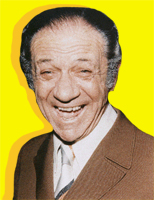Original at
Cor! Magazine
Now at
British Comedy Online
Sid James
6 May 1913 - 26 April 1976
 Born:
Sidney Joel Cohen, 6 May 1913, Johannesburg, South Africa
Born:
Sidney Joel Cohen, 6 May 1913, Johannesburg, South Africa
Died:
26 April 1976, Sunderland
Sid James arrived in England in 1947 and cornered the market in cockney
barrow boys, cigarette-puffing wide-boys and streetwise con men on the British
cinema screen. Almost an eternally present figure in B movies of the era
- in 1952 alone he made ten film appearances - Sid had the battered features,
world weary attitude and experienced eyes which spoke volumes, making him
the perfect evil gangster or war embittered villain on the edge.
His impressive list of film credits include the brilliantly disturbing Cosh
Boy with James Kenny, the stylish big screen treatment of Valentine Dyall's
radio hit The Man in Black and the interesting contemporary underworld take
on Shakespeare, Joe Macbeth. However, once Sid had cropped up as legendary,
fast-talking American film director Ed Waggermeyer opposite Tony Hancock
in Orders Are Orders, and subsequently been selected for Hancock's Half
Hour, his career took a direct comic turn. He had injected hard-edged comic
mannerisms into his crooks before, notably in the Ealing masterpiece, The
Lavender Hill Mob in 1951, but now his crafty shadowy figure delighted in
sending up Hancock's naive bumbler at every turn. The embodiment of hard
drinking, hard working, hard living and hard gambling man's man, he played
against criminal type in his first Carry On film, Carry On Constable, in
1960.
Although his Police Inspector Frank Wilkins still had a restrained eye for
the ladies and a laddish attitude that refused to buckle under the incompetence
of Kenneth Connor and Leslie Phillips. By his second Carry On, Regardless,
the Sid we know and love was to the fore - examining nurses in their undies,
delighting in a night at the boxing and generally wandering through life
with a smoke and whiskey filled chuckle. That unforgettable laugh would
become the ultimate signifier for classic comedy with historical monarchy
in Henry, black hearted outlawing in Cowboy or bemused shop stewarding in
At Your Convenience, never blocking the fact that Sid was always reassuringly
the same.
The Hancock partnership had broken down by 1960 but Galton and Simpson wrote
a series especially for Sid - Citizen James. Other popular television series
including Taxi, George and the Dragon and Two In Clover, with Victor Spinetti,
but it was the domestic situation comedy Bless This House that proved the
biggest success. From it's beginning in 1971, Sid's generation gap reactions
to his children, Robin Stewart and Sally Geeson, and bemused amazement at
his wife, Diana Coupland, was a winner. He left Carry On in a flurry, with
a double-edged role in the 1974 film Carry On Dick, headlining the stage
show Carry On London and appearing in four episodes of ATV's Carry On Laughing
series in January 1975. He died on stage during a performance of Sam Cree's
The Mating Game. For many of us, he will always be the main man.
Recommended Reading:
- Sid James by Cliff Goodwin (Century, 1995)
- The Carry On Companion by Robert Ross (B.T. Batsford, 1996)
© Biography by Robert Ross
Back to index


 Born:
Sidney Joel Cohen, 6 May 1913, Johannesburg, South Africa
Born:
Sidney Joel Cohen, 6 May 1913, Johannesburg, South Africa